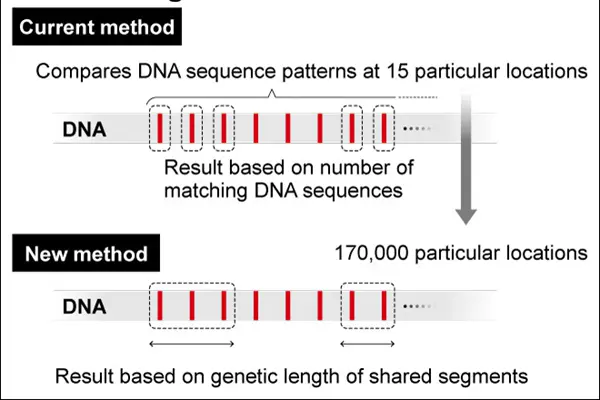Research in Japan now allows DNA analysis to match distant relatives rather than just immediate family, a development that could prove immensely useful in identifying victims in disaster situations.
The technique developed by researchers at Kyoto University accurately detects the relationship between individuals as distant as second cousins.
The team was led by Keiji Tamaki, a professor in the Department of Forensic Medicine at Kyoto University, who said the advance in DNA testing will help in identifying victims in situations like the earthquake and tsunami disaster in northeastern Japan in March 2011 that left nearly 20,000 people dead and missing.
DNA analysis compares differences of DNA sequence patterns that are contained in chromosomes.
The more closely related two people are, the more shared genetic markers they have.
The more distant relatives they are, the less DNA sequence patterns they have in common.
Up to now, DNA testing could accurately detect only relatives such as parents, children or siblings: in short, immediate family.
To identify important similarities or differences between people, one of the keys to DNA testing is knowing where to look to find particular DNA sequences, where genetic markers vary from person to person.
In conventional DNA testing methods, scientists determine how closely related two individuals are by the number of matching DNA sequences among 15 particular locations on DNA.
The new technique compares the length of matching DNA sequences at 170,000 locations, which offers greater accuracy.
With just a simple swab sample from the cheek, the new DNA test can determine blood relations between parents and children, siblings, uncles, aunts, and cousins with nearly 100 percent certainty. The test can also determine the blood ties among second cousins with 93.9 percent accuracy.
The cost of the test is expected to come in at about 10,000 yen ($100) per person, with the result available in three days. For the test, the team analyzed DNA samples of 69 men and women and positively identified all of them.
For practical purposes, further validations with more subjects are required.
“In many cases, individuals are identified by teeth and bones. But the DNA of those samples is frequently damaged,” said Chie Morimoto, a graduate student of the research team. “I want to advance the research to be able to confirm relationships accurately, even by using damaged DNA samples.”
(THE ASAHI SHIMBUN)
 简体中文
简体中文

